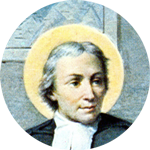The Life of St. John Baptist de La Salle
By Terry Collins
Canon of the Cathedral of Reims and eldest son of a wealthy family in the days of Louis XIV, John was expected to rise to an eminent position in the Church. But he turned his back on all that to work for the poor children of the slums of Reims, Paris, Rouen and many other town and cities of France.
In 1680, John was asked to step in and save a scheme to promote free schools for the poor of Reims, which had been started by Adrian Nyel, but which was in danger of collapsing because of the low morale of the teachers. He reorganised and revitalised the whole project, placing great emphasis on the need to give the teachers in these schools a sense of self-esteem, a sense of the dignity of their vocation as Christian educators.
He changed his whole life to respond to a crisis As the eldest son of a wealthy family, De La Salle had the world at his feet. Well educated by tutors at home and then in select schools, he could have become a prosperous lawyer like his father. Instead his sense of vocation led him to choose to be a priest, but even so he could have set his sights on a good career leading to wealth and dignities. But step by step, he started to get involved with organising schools for the street kids of Reims, of Paris and then throughout France. His genius for getting things done made his work a success, but more important was his vision that, in the eyes of God, working-class children are just as important and have as much right to education as the children of the king. In 17th Century France, people thought he was mad.
The Life of St. John Baptist de La Salle
De La Salle's most explicit statement of his vision of Christian education is found in the reflections he wrote for teachers, entitled Meditations for the Time of Retreat. The second meditation bears the heading: "What teachers must do to procure the sanctification of their students". In it he writes:-
"Consider that it is only too common for the working class and the poor to allow their children to live on their own, roaming all over as if they had no home, until they are able to be put to some work. These parents have no concern to send their children to school because they are too poor to pay teachers, or else they have to go out to look for work and leave their children to fend for themselves. The results of this condition are regrettable. These unfortunate children, accustomed to an idle life for many years, have great difficulty when it comes time for them to go to work. In addition, thorough association with bad companions, they learn to commit many sins which later on are very difficult to stop, the bad habits having been contracted over so long a period of time.
God has had the goodness to remedy so great a misfortune by the establishment of the Christian Schools, where teaching is offered free of charge and entirely for the glory of God and where children are kept all day and learn reading, writing and their religion. In these schools the children are always kept busy, so that when their parents want them to go to work, they are prepared for employment.
However, it is not enough that children be kept in school for most of the day and be kept busy. Those who are called to teach them must devote themselves especially to bringing them up in the Christian spirit. This spirit gives children the wisdom of God, which none of the princes of this world have known. It is completely opposed to the spirit and wisdom of the world."
The Vision Today
This vision is extremely practical, and yet it includes a very high estimation of the children's potential for Christian spirituality. The challenge for us today is to ensure that our Christian schools embody both the practical usefulness and the spiritual values envisaged by St. John Baptist de La Salle in his day.
"In each successive generation, the same fundamental options have to be turned into carefully selected initiatives, and tradition has to be developed by new interpretations. These in turn will lead to a new lifestyle and culture. New guidelines must be drawn up to preserve the element of excitement and to keep alive the dynamism of a new discovery.
Every generation is challenged to experience the whole adventure anew, as though for the first time, not as the reproduction of a fixed model but as a creative action in which a responsible choice is made in the light of mature study and interpretation. This is the only way to become disciples. Being a disciple does not mean being tied to the historical form which the Institute and the Church have given to the original idea. It means rather being able to distinguish what was special about the original faith commitment and being ready to become part of that."
— Herman Lombaerts. The Management and Leadership of Christian Schools page 216.
The Significance of St. John Baptist de La Salle
Nowadays, we take schools so much for granted. Sometimes, maybe, our pupils will ask themselves "Whoever invented school?", though it is usually not for the purpose of honouring the person. Their attitude is more easily summed up in Shakespeare's image of the schoolboy who "crawls like a snail unwillingly to school". So from time to time, it is good to remind them that there are plenty of children in this world who do not have to go to school.
In our big cities all over the world:
There are boys of nine and ten who spend the whole day sitting in a crowded room stitching pieces of leather together to make footballs for a few pennies an hour.
There are reports in the newspapers of Romanian orphans being taken to Berlin in groups and sent out every day by their minders to rob and steal. If they do not bring back the goods in the evening, they get beaten. They would love the chance to go to school instead.
In Madurai, India, the street kids survive by getting up early in the morning to spend most of the day picking through the city's rubbish to find things they can sell so as to get something to eat.
The city of Bangkok is so big, and the rubbish dump is so enormous, that whole families go and live on the tip to ensure they get a good spot to start picking. Children are born and brought up on the rubbish dump, with no chance of going to school unless someone steps in to get them out of the trap they are in.
Life could be bad for children in Europe too, as the story of Oliver Twist illustrates. Even today, it is easy for young people to make a mess of their lives by dropping out of the school system and following an "alternative education" in the streets. It is important to remind young people that schools were invented to give them a chance to grow and develop, and to make something of their lives. If they understand this, they will be more inclined to think highly of the teachers who see it as their vocation to give them the benefit of an education. They will also understand why the Church honours the man who did more than most to invent schools as we know them today, and who is known as the Patron Saint of Teachers.


